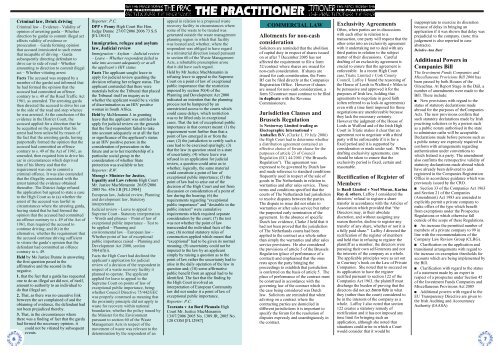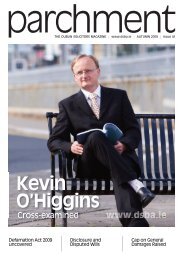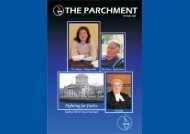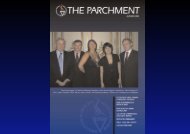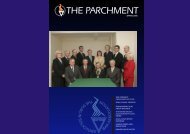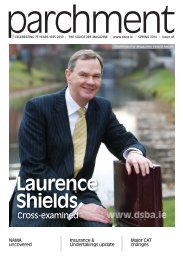A TRIBUTE TO OUTGOING PAST PRESIDENT BRIAN GALLAGHER
to download ParchSpringWeb07.pdf - the Dublin Solicitors Bar ...
to download ParchSpringWeb07.pdf - the Dublin Solicitors Bar ...
- No tags were found...
Create successful ePaper yourself
Turn your PDF publications into a flip-book with our unique Google optimized e-Paper software.
Criminal law, Drink driving<br />
Criminal law – Evidence - Validity of<br />
opinion of arresting garda – Whether<br />
direction by gardaí to commit illegal act<br />
affects validity of evidence or<br />
prosecution – Garda forming opinion<br />
that accused intoxicated to such extent<br />
that incapable of driving – Garda<br />
subsequently directing defendant to<br />
drive car to side of road – Whether<br />
amounting to direction to commit illegal<br />
act – Whether vitiating arrest<br />
Facts The accused was stopped by a<br />
member of the gardaí and informed that<br />
he had formed the opinion that the<br />
accused had committed an offence<br />
contrary to s. 49 of the Road Traffic Act<br />
1961, as amended. The arresting garda<br />
then directed the accused to drive his car<br />
to the side of the road and stop whence<br />
he was arrested. At the conclusion of the<br />
evidence in the District Court, the<br />
accused applied for a direction that he<br />
be acquitted on the grounds that his<br />
arrest had been unlawful by reason of<br />
the fact that the arresting garda, having<br />
purportedly formed the opinion that the<br />
accused had committed an offence<br />
contrary to s. 49 of the Act of 1961, as<br />
amended, then required him to drive his<br />
car in circumstances which deprived<br />
him of his liberty and that the<br />
requirement was one to commit a<br />
criminal offence. It was also contended<br />
that the illegality associated with the<br />
arrest tainted the evidence obtained<br />
thereafter. The District Judge refused<br />
the application but agreed to state a case<br />
to the High Court as to (a) whether the<br />
arrest of the accused was lawful in<br />
circumstances where the arresting garda,<br />
having stated that he had formed the<br />
opinion that the accused had committed<br />
an offence contrary to s. 49 of the Act of<br />
1961, then required the accused to<br />
continue driving; and (b) in the<br />
alternative, whether the requirement that<br />
the accused continue driving sufficient<br />
to vitiate the garda’s opinion that the<br />
defendant had committed an offence<br />
contrary to s. 49.<br />
Held by Ms Justice Dunne in answering<br />
the first question posed in the<br />
affirmative and the second in the<br />
negative.<br />
1. that the fact that a garda has requested<br />
one to do an illegal act did not, of itself,<br />
amount to authority to an individual to<br />
do that illegal act.<br />
2. That, as there was no causative link<br />
between the act complained of and the<br />
obtaining of evidence, the defendant had<br />
not been prejudiced thereby.<br />
3. That, in the circumstances where<br />
there was a finding of fact that the garda<br />
had formed the necessary opinion, it<br />
could not be vitiated by subsequent<br />
events.<br />
Reporter: P.C.<br />
DPP v Penny High Court Her Hon.<br />
Judge Dunne 27/07/2006 2006 73 S.S<br />
[FL13013]<br />
Immigration, refugee and asylum<br />
law, Judicial review<br />
Immigration – Asylum – Judicial review<br />
– Leave – Whether respondent failed to<br />
take into account adequately or at all<br />
the applicant’s HIV status<br />
Facts The applicant sought leave to<br />
apply for judicial review quashing the<br />
decision refusing her refugee status. The<br />
applicant contended that there were<br />
materials before the Tribunal that placed<br />
the Tribunal itself on inquiry as to<br />
whether the applicant would be a victim<br />
of discrimination as an HIV positive<br />
woman in South Africa.<br />
Held by McMenamin J. in granting<br />
leave that the applicant was entitled to<br />
apply for judicial review on the grounds<br />
that the first respondent failed to take<br />
into account adequately or at all the fact<br />
or significance of the applicant’s status<br />
as an HIV positive person in the<br />
consideration of persecution in the<br />
future and as to her membership of a<br />
particular social group in the<br />
consideration of whether State<br />
protection was available to her.<br />
Reporter: R.W.<br />
Msengi v Minister for Justice,<br />
Equality and Law reform High Court<br />
Mr. Justice MacMenamin 26/05/2006<br />
2005 No. 456 J.R [FL12984]<br />
European law, Judicial review, Planning<br />
and development law, Statutory<br />
interpretation<br />
Judicial review - Leave to appeal to<br />
Supreme Court - Statutory interpretation<br />
– Words and phrases – Point of law of<br />
exceptional public importance – Test to<br />
be applied – Planning and<br />
environmental law – European law –<br />
Whether point of law of exceptional<br />
public importance raised – Planning and<br />
Development Act 2000, section<br />
50(4)(f)(i).<br />
Facts the High Court had declined the<br />
applicant’s application for judicial<br />
review of a decision of the respondent in<br />
respect of a waste recovery facility it<br />
planned to operate. The applicant<br />
applied for leave to appeal to the<br />
Supreme Court on points of law of<br />
exceptional public importance, being:<br />
whether Council Directive 75/442/EEC<br />
was properly construed as meaning that<br />
the proximity principle did not apply to<br />
waste for recovery within national<br />
boundaries; whether the policy issued by<br />
the Minister for the Environment<br />
pursuant to section 60 of the Waste<br />
Management Acts in respect of the<br />
movement of waste was relevant to the<br />
determination by the respondent of an<br />
appeal in relation to a proposed waste<br />
recovery facility in circumstances where<br />
some of the waste to be treated was<br />
generated outside the waste management<br />
planning region in which that facility<br />
was located and; whether, where the<br />
respondent was obliged to have regard<br />
to a ministerial direction issued pursuant<br />
to section 60 of the Waste Management<br />
Acts, a rebuttable presumption arose<br />
that it did have such regard.<br />
Held by Mr Justice MacMenamin in<br />
refusing leave to appeal to the Supreme<br />
Court on a point of law of exceptional<br />
public importance that the restriction<br />
imposed by section 50(4) of the<br />
Planning and Development Act 2000<br />
indicated an intention that the planning<br />
process not be hampered by an<br />
unrestricted access to the courts which<br />
could cause delays, which restriction<br />
was to be lifted only in exceptional<br />
cases. That the test of exceptional public<br />
importance in that context meant: (1) the<br />
requirement went further than that a<br />
point of law emerged in or from the<br />
case; (2) the jurisdiction to certify such a<br />
case had to be exercised sparingly; (3)<br />
that the law in question stood in a state<br />
of uncertainty; (4) where leave was<br />
refused in an application for judicial<br />
review, a question could arise as to<br />
whether, logically, the same material<br />
could constitute a point of law of<br />
exceptional public importance; (5) the<br />
point of law had to arise out of the<br />
decision of the High Court and not from<br />
discussion or consideration of a point of<br />
law during the hearing; (6) the<br />
requirements regarding “exceptional<br />
public importance” and “desirable in the<br />
public interest” were cumulative<br />
requirements which required separate<br />
consideration by the court; (7) the test<br />
was not whether the point of law<br />
transcended the individual facts of the<br />
case; (8) normal statutory rules of<br />
construction applied which meant that<br />
“exceptional” had to be given its normal<br />
meaning; (9) uncertainty could not be<br />
imputed to the law by an applicant<br />
simply by raising a question as to the<br />
point of law rather the uncertainty had to<br />
arise in the daily operation of the law in<br />
question and; (10) some affirmative<br />
public benefit from an appeal had to be<br />
identified. The fact that the finding by<br />
the High Court involved an<br />
interpretation of European Community<br />
law did not render it a point of law of<br />
exceptional public importance.<br />
Reporter: P.C.<br />
Teoranta v An Bord Pleanala High<br />
Court Mr. Justice MacMenamin<br />
13/07/2006 2005 No. 1309 JR, 2005 No.<br />
120 COM [FL12987]<br />
COMMERCIAL LAW<br />
Allotments for non-cash<br />
consideration<br />
Solicitors are reminded that the abolition<br />
of capital duty in respect of shares issued<br />
on or after 7 December 2005 has not<br />
affected the requirement to file a form<br />
52/contract where shares are issued for<br />
non-cash consideration. If shares are<br />
issued for cash consideration, the Form<br />
B5 can be filed directly at the Companies<br />
Registration Office. However if shares<br />
are issued for non-cash consideration, a<br />
form 52/contract must continue to be filed<br />
in duplicate with the Revenue<br />
Commissioners.<br />
Jurisdiction Clauses and<br />
Brussels Regulation<br />
In Nestorway Limited trading as<br />
Electographic International v<br />
Ambaflex B.V. (Clarke J, 19 July 2006)<br />
the High Court had to determine whether<br />
a distribution agreement contained an<br />
effective choice of forum clause for the<br />
purposes of article 23 of Council<br />
Regulation (EC) 44/2001 (“the Brussels<br />
Regulation”). The agreement was<br />
expressed to be governed by Dutch law<br />
and made reference to standard conditions<br />
frequently used in respect of the sale of<br />
goods in The Netherlands in relation to<br />
warranties and after sales service. Those<br />
terms and conditions specified that the<br />
courts of The Netherlands had jurisdiction<br />
to resolve disputes between the parties.<br />
The dispute in issue did not relate to<br />
warranties or after sales service but rather<br />
the purported early termination of the<br />
agreement. In the absence of specific<br />
Dutch law evidence, Clarke J held that it<br />
had not been proved that the jurisdiction<br />
of The Netherlands courts had been<br />
applied to the contract as a whole rather<br />
than simply the warranties and after sales<br />
service provisions. He also considered<br />
the provisions of article 5 of the Brussels<br />
Regulation (place of performance of a<br />
contract) and emphasised that the onus<br />
rests upon the party bringing the<br />
proceedings to establish that jurisdiction<br />
is conferred on the basis of article 5. The<br />
place of performance of the contract must<br />
be construed in accordance with the<br />
governing law of the contract which in<br />
the case being considered was Dutch<br />
law. Solicitors are reminded that when<br />
advising on a contract where the<br />
contracting parties are domiciled in<br />
different jurisdictions it is important to<br />
specify the forum for the resolution of<br />
disputes expressly and unambiguously in<br />
the contract.<br />
Exclusivity Agreements<br />
Often, when parties are in discussions<br />
with each other in relation to a<br />
transaction, one party will request that the<br />
other enter into an exclusivity agreement<br />
with it undertaking not to deal with any<br />
third parties in relation to the subject<br />
matter of their discussions. Careful<br />
drafting of an exclusivity agreement is<br />
crucial to ensure that the agreement is<br />
enforceable. In a recent High Court<br />
case,Triatic Limited v Cork County<br />
Council, Laffoy J found the reasoning of<br />
the House of Lords in Walford v Miles to<br />
be persuasive and approved it for the<br />
purposes of Irish law, holding that<br />
agreements to negotiate in good faith<br />
(often referred to as lock-in agreements)<br />
even with a time limit imposed for those<br />
negotiations are unenforceable because<br />
they lack the necessary certainty.<br />
However the judgment of the House of<br />
Lords in Walford and of the Irish High<br />
Court in Triatic makes it clear that an<br />
agreement not to negotiate with a third<br />
party will be enforceable if it is for a<br />
fixed period and it is supported by<br />
consideration or made under seal. When<br />
drafting exclusivity agreements, care<br />
should be taken to ensure that the<br />
exclusivity period is fixed, certain and<br />
reasonable.<br />
Rectification of Register of<br />
Members<br />
In Banfi Limited v Noel Moran, Karina<br />
Ray & others, Laffoy J considered the<br />
directors’ refusal to register a share<br />
transfer in accordance with the Articles of<br />
Association which provided that “the<br />
Directors may, in their absolute<br />
discretion, and without assigning any<br />
reason therefor, decline to register any<br />
transfer of any share, whether or not it is<br />
a fully paid share.” Laffoy J directed the<br />
rectification of the register of members<br />
and held that in refusing to register the<br />
plaintiff as a member, the directors were<br />
pursuing their own self-interests and not<br />
the interests of the company as a whole.<br />
The applicable principles were as set out<br />
in Courtney’s book on the Law of Private<br />
Companies. She noted that to succeed on<br />
its application to have the register<br />
rectified pursuant to section 122 of the<br />
Companies Act 1963, the plaintiff must<br />
discharge the burden of proving that the<br />
directors did not act bona fide in what<br />
they (rather than the court) considered to<br />
be in the interests of the company as a<br />
whole. Laffoy J also noted that section<br />
122 creates a statutory remedy of<br />
rectification and it has not imposed any<br />
time limit for bringing such an<br />
application, although she noted that<br />
situations could arise in which a Court<br />
would consider that it would be<br />
inappropriate to exercise its discretion<br />
because of delay in bringing an<br />
application if it was shown that delay was<br />
prejudicial to the company. (note: this<br />
judgement is also reported in case<br />
abstracts).<br />
Deirdre-Ann Barr<br />
Additional Powers in<br />
Companies Bill<br />
The Investment Funds Companies and<br />
Miscellaneous Provisions Bill 2006 has<br />
been passed by both Houses of the<br />
Oireachtas. At Report Stage in the Dáil, a<br />
number of amendments were made to the<br />
Bill. These include:<br />
New provisions with regard to the<br />
status of statutory declarations made<br />
abroad for the purposes of theCompanies<br />
Acts. The new provisions confirm that<br />
such statutory declarations made by Irish<br />
practising solicitors or by a person such<br />
as a public notary authorised in the state<br />
to administer oaths will be acceptable.<br />
Declarations made before persons such as<br />
a public notary are expressly required to<br />
conform with arrangements regarding<br />
authentication under conventions to<br />
which Ireland is a party. The amendment<br />
also confirms the retrospective validity of<br />
statutory declarations made abroad which<br />
have already been delivered to and<br />
registered in the Companies Registration<br />
Office in accordance guidance which was<br />
previously issued by the CRO.<br />
Section 33 of the Companies Act 1963<br />
and Section 21 of the Companies<br />
(Amendment) Act 1983 are amended to<br />
explicitly permit a private company to<br />
make offers of the type which benefit<br />
from exemptions under the Prospectus<br />
Regulations or which otherwise fall<br />
outside of the scope of these Regulations.<br />
An increase the permitted number of<br />
members of a private company to 99 in<br />
line with the recommendations of the<br />
Company Law Review Group (CLRG).<br />
Clarification on the application and<br />
transitional arrangements with regard to<br />
the increase on exemption thresholds for<br />
accounts which are being implemented by<br />
the Bill.<br />
Clarification with regard to the status<br />
of a statement made by an expert in<br />
respect of a prospectus under Section 45<br />
of the Investment Funds Companies and<br />
Miscellaneous Provisions Act 2005<br />
Additional powers with regard to the<br />
EU Transparency Directive are given to<br />
the Irish Auditing and Accountancy<br />
Authority (IAASA)


